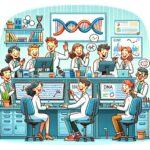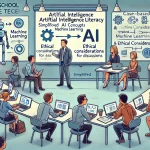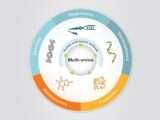
The Future of Global Collaboration and Ethical Considerations: A 2043 Framework
January 24, 2025Over the next two decades, global collaboration and ethical governance will become the cornerstones of scientific progress, driven by existential threats (climate change, pandemics) and transformative technologies (AI, CRISPR). These forces will demand unprecedented cooperation across borders while challenging humanity to redefine equity, privacy, and shared responsibility. Below is a visionary synthesis of this future, blending technological innovation, ethical imperatives, and societal evolution.
1. The Evolution of Global Collaboration
A. Hyperconnected Scientific Networks
- Decentralized Research DAOs: Blockchain-based Decentralized Autonomous Organizations (DAOs) like OpenScienceChain will govern global projects (e.g., fusion energy, microbiome mapping), distributing funding and data transparently. Researchers in Lagos, Lima, and Lahore co-author studies via tokenized incentives.
- AI-Mediated Collaboration: Real-time AI translators and cultural mediators (e.g., MetaCollab) will dissolve language and disciplinary barriers. A climate scientist in Norway and a traditional healer in the Amazon co-design forest conservation algorithms.
- Quantum-Secured Data Lakes: Federated data repositories (e.g., WHO OneHealth Cloud) will share pandemic pathogen genomes, antibiotic resistance patterns, and climate-health models across nations, protected by quantum encryption.
B. Crisis-Driven Coalitions
- Pandemic SWAT Teams: A Global Pathogen Response Network (2030) deploys AI-trained rapid-response units to outbreak zones, synthesizing local genomic data with global immunity maps to contain pathogens in <72 hours.
- Climate Resilience Grids: A UNESCO Climate-Omics Initiative links multi-omics data (e.g., heat-stress biomarkers in crops) with AI-driven farming strategies, protecting food security in vulnerable regions.
C. Citizen Science at Scale
- Personal Labs: $100 CRISPR kits and portable sequencers (e.g., MiniON 2040) enable citizens to contribute data to projects like EarthBioAtlas, crowdsourcing biodiversity and disease surveillance.
- Gamified Research: Apps like CureQuest turn protein-folding or drug discovery into collaborative games, with players earning crypto rewards for breakthroughs.
2. Ethical Considerations: From Principles to Embedded Systems
A. AI Ethics as Infrastructure
- Algorithmic Constitutional Courts: Independent bodies like the EU Algorithmic Oversight Board (2035) audit AI systems for bias, requiring explainability certifications for tools used in healthcare, hiring, or policing.
- Ethical AI by Design: Frameworks like NeuroSymbolic Ethics Engines automatically flag unethical research proposals (e.g., dual-use CRISPR applications) before funding is granted.
B. Data Sovereignty and Equity
- Indigenous Data Guardianship: The Global Indigenous Data Accord (2032) mandates that genetic or ecological data from traditional lands cannot be commercialized without consent and profit-sharing.
- Data Reparations: Tech giants fund a Digital Colonialism Reparations Fund (2040), compensating nations exploited for data (e.g., African genomic datasets used for Western drug patents).
C. Genetic and Neuroethics
- CRISPR Equity Laws: The UN Gene Editing Pact (2035) bans enhancement edits (e.g., intelligence, appearance) but subsidizes curative therapies for low-income nations.
- Neuroprivacy Rights: Brain-computer interfaces (BCIs) require “neuroconsent” protocols, ensuring neural data isn’t mined for advertising or surveillance.
3. Societal and Cultural Shifts
A. Redefining Global Citizenship
- Planetary Health Passports: Digital IDs integrate vaccination records, microbiome profiles, and carbon footprints, enabling visa-free travel for those meeting global health/climate thresholds.
- Cross-Cultural Ethics Education: Schools worldwide adopt curricula on Bioethical Futures, teaching students to navigate dilemmas like AI-personhood or CRISPR equity.
B. Corporate Accountability
- Ethical Profit Indexes: Stock exchanges rate companies on metrics like “data fairness” and “collaboration impact.” Firms like BioGen lose investors after violating open-science pledges.
- Open Patent Pools: Pharma giants share patents for essential medicines (e.g., malaria vaccines) via the Medicines Patent Commons, spurred by public pressure and blockchain-tracked compliance.
C. Conflict and Reconciliation
- Bio-Disarmament Treaties: Nations agree to destroy bioweapon-capable research under WHO-UNESCO BioPeace inspections, using AI to detect dual-use risks in publications.
- Climate Reparations Tech: High-emission nations fund Solar Desalination Hubs in drought zones, leveraging shared IP to build trust.
4. 2043: A Day in a Collaboratively Governed World
- 7:00 AM: A researcher in Kenya uploads a novel antibiotic gene to OpenScienceChain, triggering automatic profit-sharing contracts with local communities.
- 12:00 PM: The Global Pathogen Network detects a zoonotic virus in Indonesian bats. AI simulates 10,000 containment strategies; vaccines are in production within 48 hours.
- 3:00 PM: A teenager in Mumbai uses a $50 CRISPR kit from BioForAll to engineer drought-resistant soil bacteria, earning crypto credits for her village.
- 8:00 PM: A citizen jury in Brazil debates a gene-drive project to eradicate malaria, guided by an Ethics AI Mediator that ensures Indigenous voices are prioritized.
Conclusion: The Tightrope of Progress
By 2043, global collaboration and ethical frameworks will be inseparable from innovation itself. Future generations will inherit tools to eradicate disease, stabilize the climate, and democratize knowledge—but also face existential risks from misaligned AI, bioweapons, and genetic inequality. The difference between utopia and dystopia lies in embedding ethics into the architecture of progress: ensuring AI serves humanity, data empowers rather than exploits, and science remains a global commons. The next 20 years must prioritize not just what we can achieve, but how—with equity, transparency, and shared purpose as non-negotiable pillars.


















